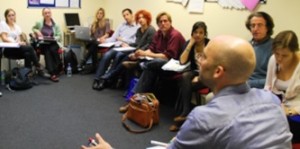Cactus Worldwide Blog: February 2014 – Focus On TEFL
Focus on: Cactus TEFL Special Offers
Hello, and welcome to the February 2014 edition of the Cactus Worldwide blog! And also, welcome to our agency – Cactus Worldwide – where our team of experienced course advisors are here every day to discuss options with you and help set up a varied range of unique language-learning or language-teaching experiences, all over the globe, throughout the year, for all of our fantastic students.
This month’s blog is all about the special offers we currently have available to those of you considering taking a TEFL course this year, in the U.K. or abroad.
If you have any questions about any of the special offers that you read about here, please feel free to contact our experienced TEFL admissions advisor, Peyman Shameli, directly via info@cactusworldwide.com and he’d be happy to answer any questions.
1. £47 off the Cambridge CELTA course in April in Krakow, Poland!
Now only £868 for the 4-week CELTA course starting 7th April (finishing 9th May).
Click below to find out more about this last-minute offer and apply now!
2. £50 off the Full-Time March Trinity CertTESOL + £100 off the Part-Time April Trinity CertTESOL in Oxford Circus, Central London!
Established in 1962, St George International operates out of a new purpose-built centre, situated in the Fitzrovia district of Central London. Although only three minutes away from busy Oxford Circus underground, the school itself lies in a wonderfully quiet back street.
The centre is widely regarded as being a specialist in the field of EFL, having run high-quality, good-value teacher training courses in Central London since the summer of 1993. Since then, over two thousand trainees have successfully passed through their doors as newly-qualified English language teachers of the globally-recognised Trinity College London Cert TESOL.
Click below to find out more about the 2014 special offers and apply now!
Full-time Trinity CertTESOL in March with Cactus TEFL & St George International – now just £845
Part-time Trinity CertTESOL in April with Cactus TEFL & St George International – now just £895
St George International, Oxford Circus, Central London
3. Free Course Book (Learning Teaching by Jim Scrivener, worth £30) for every successful Trinity TESOL applicant in 2014 @ British Study Centres in Brighton! Exclusive to Cactus TEFL
BSC in Brighton was opened in 2008 and is located in a beautifully refurbished, four-storey Victorian house between Brighton and Hove, with a garden, a terrace and a 5-star cafeteria, and in an ideal location with the beach, Brighton attractions and city centre only 15 minutes away. The school has 15 spacious classrooms with large windows, a fully stocked study centre and library, a computer room as well as WiFi throughout the building. This school is not only newly-renovated, well-resourced and a pleasant training environment, it is also a real, thriving workplace where students can experience the reality of teaching.
Every little helps, and this year they are offering every successful Trinity TESOL applicant applying via Cactus TEFL a free copy of arguably the most highly-regarded text in the EFL industry – Learning Teaching by Jim Scrivener – worth £30.
Click the link below to take advantage of this special offer!
Trinity TESOL in Brighton with Cactus TEFL & British Study Centres
The garden at British Study Centres in Brighton
4. Free Course Book (Learning Teaching by Jim Scrivener, worth £30) for every successful Trinity TESOL applicant in 2014 @ Athena Teacher Training in Bournemouth! Exclusive to Cactus TEFL
Just two minutes from Bournemouth’s long sandy beaches and city centre, Athena Teacher Training forms one of Bournemouth’s largest language schools and prides itself on offering a friendly, professional atmosphere in which to develop the teaching skills vital to all good teachers.
The school is offering every successful Trinity TESOL applicant applying via Cactus TEFL a free copy of arguably the most highly-regarded text in the EFL industry – Learning Teaching by Jim Scrivener – worth £30.
Click the link below to take advantage of this special offer!
Trinity TESOL in Bournemouth with Cactus TEFL & Athena Teacher Training
5. Discounted Part-Time Trinity Cert TESOL course in Oxford this March – now only £795!
ISIS Oxford are offering £55 off off their part-time Cert TESOL course starting 4th March – normally £850, now just £795.
This 14 week part-time course leads to the award of the Trinity Certificate in TESOL. Along with the RSA CELTA, this is the most widely accepted qualification for teachers of EFL/ESOL, with recognition from schools and colleges worldwide and bodies such as the British Council and the QCA. You can anticipate a demanding but enjoyable month, at the end of which you will have the tools and the confidence to take up a first TESOL position either in the UK or abroad.
If you’re interested in taking a last-minute Cert TESOL course this is a wonderful opportunity to study in the beautiful, iconic city of Oxford at a reduced price.
Click the link below to find out more and apply!
Part-time Trinity Cert TESOL in Oxford with Cactus TEFL and ISIS Oxford
6. 10% off a CELTA course in the Sevilla sunshine this March, with Cactus TEFL & Clic! – but be quick, offer only valid for applicants applying before Friday February 21st
The Andalucian ‘Clic Sevilla’ school building
Are you considering teaching English in Spain this year? If so, we highly recommend taking a course in-country, as this offers many significant benefits, such as a valuable in-country contact for jobs advice and support. Trainees taking their TEFL course abroad also benefit from teaching students native to that country during their teaching practice sessions, so they graduate from the course already highly equipped with knowledge of these learners’ specific academic and cultural learning needs.
This highly popular school in Sevilla, called Clic, is part of an international network of schools (for teacher training and teaching Spanish as a foreign language) located in the heart of the town, just 10 minutes’ walking distance to the cathedral and 2 minutes to Plaza Nueva. The building is a very well-equipped Andalucian house with a reception desk on the ground floor, training director’s office, teachers’ room, classrooms, internet access, kitchen, vending machines and common room on the second and third floors and a large roof terrace. The school also owns its own cafe/bar (serving drinks and tapas) on the same street. This provides an excellent meeting place for both teachers and students from all over the world.
Interested? Visit the link below to find out more about the course and download an application form for the 17th March CELTA course!
Cambridge CELTA in Sevilla with Cactus TEFL & Clic International House
The ‘Clic’ cafeteria in Sevilla
We hope this selection has been of interest, and may have given you some ideas for some bargain study options for the year ahead. Any Qs at all, please feel free to contact me directly and I’d be happy to help.
Happy planning 😉
Best Wishes,
Ollie
—————————————————————————————————————–
Oliver Donovan
Agency Product Manager
Email: oliver.donovan@cactusworldwide.com















